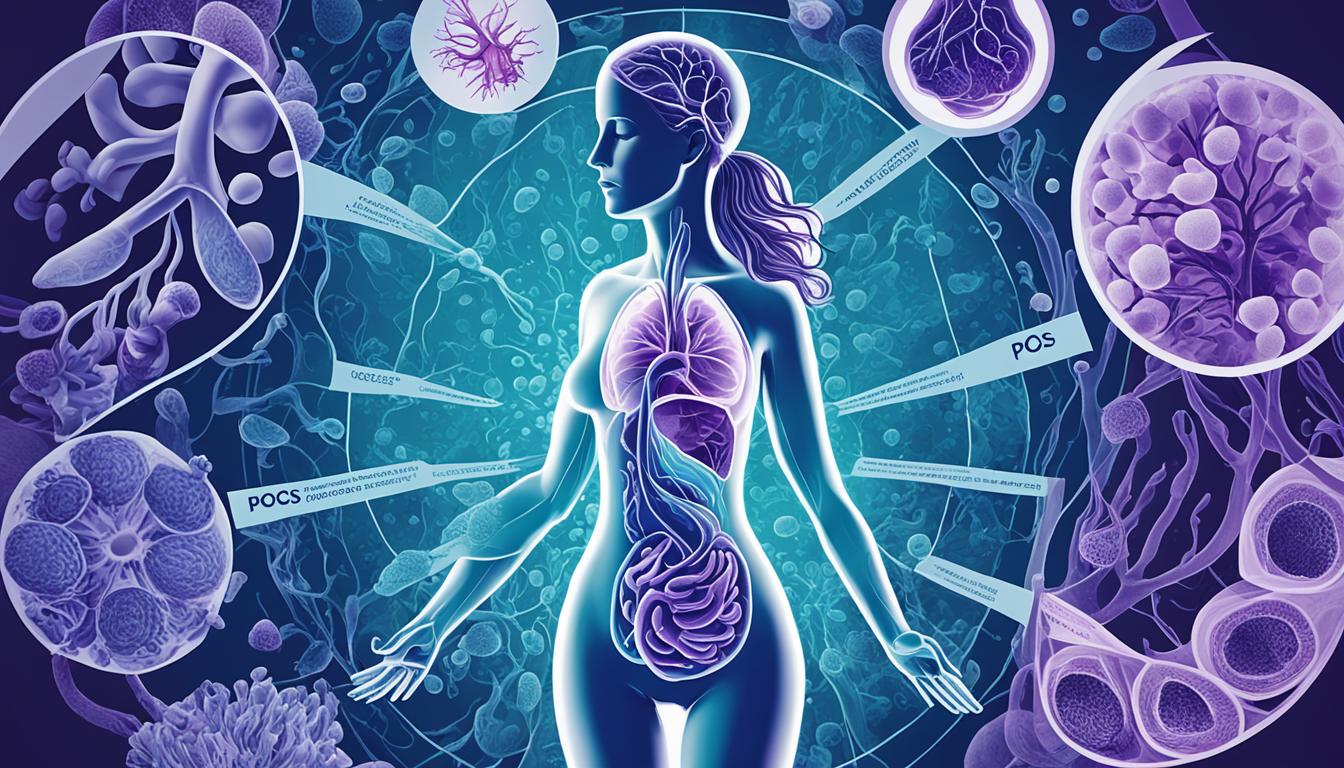Dear reader,
Have you struggled with weight gain, hormonal imbalances, and their symptoms? You’re not alone.
I’ve lived with Polycystic Ovary Syndrome (PCOS) and know the daily struggles. PCOS feels like a never-ending fight affecting our bodies and minds.
The Impact of Diet on PCOS Symptoms
PCOS can bring on many symptoms. These include more hair growth, acne, gaining weight, and trouble with periods. It can also lead to not being able to have children. What you eat can affect these symptoms.
Following a good PCOS diet is important. It should help keep your blood sugar stable and lower inflammation. This can make a big difference in how you feel and your health. Choose natural, unprocessed food. Stay away from things known to cause inflammation. Doing this can lessen your symptoms and stop future problems.
Adding healthy, nutrient-rich foods to your meals is a smart move. Eat lots of fresh fruits and veggies, lean meats, whole grains, and good fats. This can balance your hormones and keep you healthy despite PCOS.
On a PCOS diet, avoid foods that may make things worse. Stay away from processed foods, foods high in sugar, unhealthy fats, and anything that causes inflammation. Changing what you eat can lessen symptoms and make you feel better.
To manage PCOS well, diet alone may not be enough. Being active, learning how to manage stress, and changing other life habits can help a lot too.
Diet changes designed for PCOS can really help. They improve your health and might ease your symptoms. It’s key to work together with your doctor to set up a plan. This plan should be just right for you and your goals.
Foods to Avoid with PCOS
When dealing with PCOS through diet, knowing which foods to avoid is key. Some foods can make PCOS symptoms worse and up the risk of other diseases. By saying no to these foods, people with PCOS can manage their condition better. Also, it helps to improve their overall health.
Fried Foods
Foods that are fried are full of bad fats. They can make your body more inflamed. These foods often have trans fats, which can make your body not react well to insulin. This can lead to high blood sugar.
Saturated Fats
Thing like fatty meats and full fat dairy are high in saturated fats. They make inflammation and insulin resistance worse. It’s better to pick lean meats and low-fat dairy for people with PCOS.
Processed Snacks
Snacks like chips and cookies have lots of unhealthy stuff, like sugars and fats. These can make your blood sugar go up fast. They also add to body weight. Instead, go for whole foods as a snack.
Sugary Beverages
Drinks with lots of sugar, like soda and juices, are full of quick sugars. They can mess with your blood sugar and how you react to insulin. Water or unsweetened drinks are much better for you.
Alcoholic Beverages
Alcohol can mess with your hormones and cause more inflammation with PCOS. Plus, it can slow down how well your liver handles sugar. So, it’s best to limit or skip alcohol to manage PCOS better.
Refined Flour
Products made with white flour, such as white bread, lack fiber and nutrients. They cause fast spikes in blood sugar. Opt for whole grains to keep your blood sugar steady.
High-Sugar Cereals
Cereals that claim to be good for you often have a lot of added sugar. This sugar can mess with your blood sugar and add to your weight. It’s better to pick low-sugar cereals or foods like oats and proteins for breakfast.
White Rice
White rice is quick to make your blood sugar rise and worsen insulin resistance. Eating brown rice or other whole grains is a better choice. They help keep your blood sugar in check.
Choosing the right foods and avoiding unhealthy ones can really help with managing PCOS. Always talk to a pro, like a doctor or a dietitian, for a diet plan that fits your needs best. They can help you find the best foods for you.
Image:
Best Foods for PCOS
Diet is crucial in managing PCOS. Choosing foods that help your health is key. You should swap out bad foods for better ones. This way, people with PCOS improve how they feel in the long run. Let’s look at some top foods for a PCOS-friendly diet:
- Omega-3 rich fish: Fatty fish like salmon has important fatty acids. They lower inflammation and boost heart health.
- Olive oil: Use olive oil instead of butter or margarine. It’s perfect for cooking and making salad dressings.
- Beans and legumes: Eat beans and legumes like lentils instead of red meat. They’re high in protein but low in harmful fats.
- Non-starchy vegetables: Vegetables such as broccoli and spinach are full of nutrients and fiber. Plus, they don’t spike blood sugar much.
- Whole grains: Choose whole grains over refined ones. So, brown rice and sorghum are better. They help keep blood sugar steady and make insulin work better.
- Whole fruits: Add fruits like berries and apples to your diet. They’re full of fiber, making digestion better and sugar absorption slower.
Adding these foods to your PCOS diet helps a lot. It’s great for your health in general. Plus, it helps manage PCOS symptoms and supports the right kind of nutrition for PCOS.

Fad Diets and PCOS
Managing PCOS often involves aiming for weight loss to handle insulin resistance. However, it’s not good to follow fad diets that cut out whole food groups. These diets usually recommend not eating carbs, which can lead to a lack of important nutrients. This is not a realistic solution. It’s better to pick carbs that don’t raise your blood sugar too much.
For PCOS, it’s crucial to keep blood sugar steady all day. You can do this by eating smaller meals more often and adding in well-balanced snacks. Doing this helps prevent big changes in your blood sugar and can make insulin resistance better.
Intermittent fasting is a popular choice for losing weight but may not suit everyone with PCOS. Having specific times for eating can sometimes cause you to eat too much in the non-fasting times. Making a diet plan that’s just right for your PCOS should be done with the help of a PCOS expert.
PCOS is something you manage over time, not with a quick solution. It’s vital to choose an eating plan that you can stick with and that helps with weight loss and controlling PCOS.
Other Factors for PCOS Management
Keeping a healthy diet is just the start for those with PCOS. It’s key to also include regular exercise, enough sleep, and ways to manage stress. By doing this, people with PCOS can feel better and keep their condition under control.
PCOS Exercise: Exercise is crucial if you have PCOS. It helps your body respond better to insulin, aids weight loss, and boosts overall health. Try to exercise at a moderate level for 150 minutes each week. Activities like walking fast, swimming, biking, or dancing are great. They help manage PCOS symptoms and keep your weight in check.
Sufficient Sleep: Good sleep is important for your hormones and health. Every night, aim for 7-9 hours of restful sleep. This can help keep your hormones balanced and help with PCOS. A regular sleep schedule, a calm bedtime routine, and staying away from caffeine and excitement before bed can help you sleep better.
PCOS Stress Management: Stress can make PCOS symptoms worse and hurt your health. It’s crucial to manage it. Try stress relief methods like yoga, meditation, deep breaths, or favorite hobbies. Finding ways to relax and taking care of yourself can do wonders for your well-being.

A holistic approach to managing PCOS includes exercise, sleep, and stress management. Along with a good diet, these elements improve your health. Talking to healthcare experts for a personalized plan is a great idea. They can help you create a strategy that meets your specific needs and goals.
Health Effects of PCOS
Polycystic ovary syndrome (PCOS) brings both physical symptoms and health risks. It is linked to obesity, heart disease, and diabetes. People with PCOS often face symptoms like too much hair, acne, weight gain, and more. These come from insulin resistance and too many androgens.

Obesity
PCOS and obesity often go hand in hand. The hormonal changes from PCOS make losing weight tough. This puts women with PCOS at more risk of being obese. Obesity makes PCOS symptoms and health threats worse.
Heart Disease
Having PCOS can up your heart disease risk. It causes bad lipid profiles, high blood pressure, and inflammation. This can lead to atherosclerosis and up the chances of heart attacks and strokes.
Diabetes
PCOS’s link to insulin resistance can turn into type 2 diabetes. It makes blood sugar levels rise, eventually leading to diabetes. Eating well and staying active are key to avoid diabetes with PCOS.
Managing PCOS with the right diet and lifestyle choices can lower its health risks. A balanced diet, exercise, and ways to cope with stress can help keep hormones in check. This improves how your body uses insulin and boosts your health overall.
How Diet Affects PCOS
People with PCOS often have higher insulin and insulin resistance. This affects their health in big ways. Insulin resistance can cause high blood sugar, weight gain, and more. It’s very important for those with PCOS to understand how diet can help them.
A diet full of refined carbs can make insulin resistance worse. This includes sugary snacks and processed foods. Such foods make blood sugar jump, making the body’s insulin work harder.
To manage PCOS well, the right food choices are crucial. It’s key to pick foods that control blood sugar and lower certain hormone levels. Eating foods high in fiber, lean protein, and anti-inflammatory properties can make a difference.
Foods with lots of fiber slow down sugar’s entry into the bloodstream. This stops sudden jumps in blood sugar. It can make the body more sensitive to insulin and lower risks linked to high blood sugar.
Proteins from lean sources like fish and tofu are great for stable blood sugar. They don’t cause big spikes like some carbs. Including these in your meals can keep your energy steady and make you feel full longer.
Anti-inflammatory foods are also valuable for those with PCOS. Examples are tomatoes, leafy greens, almonds, and oily fish. These help fight body inflammation, which is linked to PCOS symptoms. Eating them can lessen the impact of these symptoms.
Choosing the right foods can help manage PCOS and improve health. By focusing on meals beneficial for blood sugar and lessening inflammation, people with PCOS can live better lives.

Good and Bad Foods for PCOS
Choosing the right foods can really help with PCOS management. A good diet for PCOS includes high fiber veggies, lean protein, and anti-inflammatory foods.
Fiber-rich Powerhouses
Foods high in fiber help keep blood sugar levels normal and fight insulin resistance. Make sure to eat fiber-rich veggies like broccoli, greens, peppers, and beans. They not only give you important nutrients but also keep your blood sugar steady.
- Cruciferous vegetables: Broccoli, cauliflower, Brussels sprouts, and cabbage.
- Greens: Spinach, kale, and Swiss chard.
- Peppers: Bell peppers, chili peppers, and jalapeños.
- Beans: Black beans, chickpeas, and lentils.
Eating foods with lots of fiber, such as almonds, berries, and sweet potatoes, is great for PCOS. They make you feel full and keep your blood sugar level.
Lean Proteins for Satiety
Lean proteins are key because they provide a feeling of fullness without raising blood sugar too much. Include things like tofu, chicken, and fish in your meals for a balanced diet.
- Tofu: A versatile plant-based protein option that can be grilled, stir-fried, or added to salads.
- Chicken: Opt for skinless chicken breasts, which are low in fat.
- Fish: Fatty fish like salmon, trout, and mackerel are rich in omega-3 fatty acids, which have anti-inflammatory properties.
Anti-Inflammatory Heroes
PCOS often involves inflammation. Foods that fight inflammation include tomatoes, kale, spinach, nuts, olive oil, fruits, and fatty fish.
Tomatoes, kale, and spinach fight inflammation with their nutrients. Almonds and walnuts have healthy fats. Include fruits like berries, and eat fatty fish for the good omega-3 fats.
By eating foods rich in fiber, lean protein, and anti-inflammatory properties, you can help manage PCOS. Sticking to these choices supports your health.
Avoiding certain foods is also crucial for PCOS. Stay away from refined carbs, sweets, and inflammation-causing foods. Making smart food choices can really improve PCOS management and your health in general.
For more information on how diet affects PCOS, check out this article.

Conclusion
Dealing with PCOS means following a detailed plan. This plan includes eating well, moving often, sleeping enough, handling stress, and making smart lifestyle choices. A big part of this is sticking to a balanced diet.
This diet should steer clear of foods that make PCOS worse. Instead, it should include foods that help control blood sugar and fight inflammation. By choosing what we eat carefully, we can take charge of our PCOS and feel better overall.
It’s key to work closely with healthcare professionals. They’ll help create a plan that’s just right for you. This plan should cover what you eat, how active you are, and how you manage stress.
Working together with your healthcare team can make a big difference. It helps you control your health and lessen PCOS symptoms. Your effort and their advice can lead to a healthier, happier you.
Putting your health first and making wise decisions can help you live well with PCOS. Keep at it, following the plan you’ve made with your healthcare provider. This way, you can make real progress in managing PCOS and boost your well-being.














